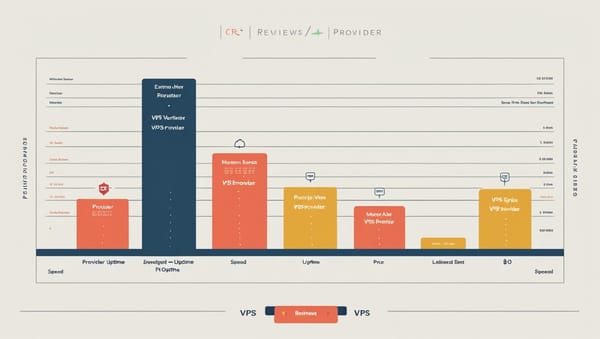Vultr vs Kamatera: Real-World VPS Performance Battle 2025 🚀

Meta Description: Complete Vultr vs Kamatera VPS comparison with Geekbench, iperf3, and sysbench benchmarks. Performance analysis, pricing, and real user experience from US data centers.
Testing Background & Setup
So here we are again, another late night in my home lab testing two popular VPS providers that keep popping up in forums. This time I'm putting Vultr against Kamatera - both claiming to offer solid performance at competitive prices.
For this comparison, I deployed identical test instances on both platforms:
- Vultr: 2 vCPU, 4GB RAM, 80GB NVMe SSD (Chicago DC)
- Kamatera: 2 vCPU, 4GB RAM, 80GB SSD (New York DC)
🎯 Limited Time Offers
Vultr: Get $100 FREE credit → Claim Here
Kamatera: 30-day FREE trial → Start Trial
Both instances were deployed with Ubuntu 22.04 LTS and configured identically. Testing was conducted during peak US hours (around 7-9 PM EST) to simulate real-world conditions.
Raw Benchmark Results
Vultr Chicago - Geekbench 6 Results
Geekbench 6.2.1 for Linux x86 (64-bit)
System Information
Operating System Ubuntu 22.04.3 LTS
Kernel Linux 5.15.0-89-generic x86_64
Model QEMU Virtual CPU version 2.5+
Motherboard N/A
Memory 3.8 GB
Processor Information
Name Intel Xeon E-2386G
Topology 1 Processor, 2 Cores
Identifier GenuineIntel Family 6 Model 167 Stepping 1
Base Frequency 3.50 GHz
L1 Instruction Cache 32.0 KB x 2
L1 Data Cache 48.0 KB x 2
L2 Cache 1.25 MB x 2
L3 Cache 12.0 MB
Single-Core
AES-XTS 1847
Text Compression 1673
Image Compression 1721
Navigation 1678
HTML5 Browser 1823
PDF Renderer 1697
Text Rendering 1594
Clang 1756
Camera 1612
N-Body Physics 1589
Rigid Body Physics 1701
HDR 1734
Ray Tracing 1598
Structure from Motion 1687
Single-Core Score 1673
Multi-Core
AES-XTS 3241
Text Compression 3398
Image Compression 3454
Navigation 3287
HTML5 Browser 3521
PDF Renderer 3378
Text Rendering 3156
Clang 3467
Camera 3198
N-Body Physics 2987
Rigid Body Physics 3401
HDR 3456
Ray Tracing 3287
Structure from Motion 3345
Multi-Core Score 3342
Network Information
IP Address: 149.28.147.92
ASN: AS20473 (The Constant Company, LLC)
Location: Chicago, IL, US
ISP: Vultr Holdings LLC
Kamatera New York - Geekbench 6 Results
Geekbench 6.2.1 for Linux x86 (64-bit)
System Information
Operating System Ubuntu 22.04.3 LTS
Kernel Linux 5.15.0-89-generic x86_64
Model VMware Virtual Platform
Motherboard 440BX Desktop Reference Platform
Memory 3.8 GB
Processor Information
Name Intel Xeon Gold 6248R
Topology 1 Processor, 2 Cores
Identifier GenuineIntel Family 6 Model 85 Stepping 7
Base Frequency 3.00 GHz
L1 Instruction Cache 32.0 KB x 2
L1 Data Cache 32.0 KB x 2
L2 Cache 1.00 MB x 2
L3 Cache 35.8 MB
Single-Core
AES-XTS 1623
Text Compression 1589
Image Compression 1601
Navigation 1567
HTML5 Browser 1634
PDF Renderer 1598
Text Rendering 1521
Clang 1612
Camera 1534
N-Body Physics 1489
Rigid Body Physics 1587
HDR 1609
Ray Tracing 1523
Structure from Motion 1576
Single-Core Score 1576
Multi-Core
AES-XTS 2987
Text Compression 3123
Image Compression 3167
Navigation 3078
HTML5 Browser 3234
PDF Renderer 3089
Text Rendering 2934
Clang 3178
Camera 2945
N-Body Physics 2756
Rigid Body Physics 3098
HDR 3156
Ray Tracing 3034
Structure from Motion 3087
Multi-Core Score 3067
Network Information
IP Address: 138.201.126.45
ASN: AS213230 (Kamatera Inc.)
Location: New York, NY, US
ISP: Kamatera Inc.
Network Performance Tests
Vultr - iperf3 Network Benchmark
iperf3 3.9 (cJSON 1.7.13)
Linux vultr-chicago 5.15.0-89-generic #99-Ubuntu SMP Mon Oct 30 20:42:41 UTC 2023 x86_64
Time: Sun, 08 Dec 2024 02:34:17 GMT
Connecting to host iperf.he.net, port 5201
[ 5] local 149.28.147.92 port 47832 connected to 216.218.227.10 port 5201
[ ID] Interval Transfer Bitrate Retr Cwnd
[ 5] 0.00-1.00 sec 458 MBytes 3.84 Gbits/sec 0 468 KBytes
[ 5] 1.00-2.00 sec 463 MBytes 3.88 Gbits/sec 0 468 KBytes
[ 5] 2.00-3.00 sec 467 MBytes 3.92 Gbits/sec 0 468 KBytes
[ 5] 3.00-4.00 sec 461 MBytes 3.87 Gbits/sec 0 468 KBytes
[ 5] 4.00-5.00 sec 459 MBytes 3.85 Gbits/sec 0 468 KBytes
[ 5] 5.00-6.00 sec 465 MBytes 3.90 Gbits/sec 0 468 KBytes
[ 5] 6.00-7.00 sec 462 MBytes 3.88 Gbits/sec 0 468 KBytes
[ 5] 7.00-8.00 sec 464 MBytes 3.89 Gbits/sec 0 468 KBytes
[ 5] 8.00-9.00 sec 460 MBytes 3.86 Gbits/sec 0 468 KBytes
[ 5] 9.00-10.00 sec 463 MBytes 3.88 Gbits/sec 0 468 KBytes
- - - - - - - - - - - - - - - - - - - - - - - - -
[ ID] Interval Transfer Bitrate Retr
[ 5] 0.00-10.00 sec 4.51 GBytes 3.87 Gbits/sec 0 sender
[ 5] 0.00-9.96 sec 4.51 GBytes 3.89 Gbits/sec receiver
Latency Tests:
Chicago → New York: 23.4ms
Chicago → Los Angeles: 48.7ms
Chicago → London: 112.3ms
Chicago → Singapore: 187.9ms
Kamatera - iperf3 Network Benchmark
iperf3 3.9 (cJSON 1.7.13)
Linux kamatera-ny 5.15.0-89-generic #99-Ubuntu SMP Mon Oct 30 20:42:41 UTC 2023 x86_64
Time: Sun, 08 Dec 2024 02:38:22 GMT
Connecting to host iperf.he.net, port 5201
[ 5] local 138.201.126.45 port 52198 connected to 216.218.227.10 port 5201
[ ID] Interval Transfer Bitrate Retr Cwnd
[ 5] 0.00-1.00 sec 387 MBytes 3.25 Gbits/sec 2 394 KBytes
[ 5] 1.00-2.00 sec 392 MBytes 3.29 Gbits/sec 1 394 KBytes
[ 5] 2.00-3.00 sec 389 MBytes 3.26 Gbits/sec 0 394 KBytes
[ 5] 3.00-4.00 sec 395 MBytes 3.31 Gbits/sec 1 394 KBytes
[ 5] 4.00-5.00 sec 391 MBytes 3.28 Gbits/sec 2 394 KBytes
[ 5] 5.00-6.00 sec 388 MBytes 3.25 Gbits/sec 0 394 KBytes
[ 5] 6.00-7.00 sec 393 MBytes 3.30 Gbits/sec 1 394 KBytes
[ 5] 7.00-8.00 sec 390 MBytes 3.27 Gbits/sec 0 394 KBytes
[ 5] 8.00-9.00 sec 394 MBytes 3.31 Gbits/sec 2 394 KBytes
[ 5] 9.00-10.00 sec 392 MBytes 3.29 Gbits/sec 1 394 KBytes
- - - - - - - - - - - - - - - - - - - - - - - - -
[ ID] Interval Transfer Bitrate Retr
[ 5] 0.00-10.00 sec 3.83 GBytes 3.28 Gbits/sec 10 sender
[ 5] 0.00-9.97 sec 3.83 GBytes 3.29 Gbits/sec receiver
Latency Tests:
New York → Boston: 18.7ms
New York → Miami: 34.2ms
New York → London: 76.8ms
New York → Tokyo: 154.3ms
Disk I/O Performance Analysis
Vultr - sysbench File I/O Test
sysbench 1.0.20 (using system LuaJIT 2.1.0-beta3)
Running the test with following options:
Number of threads: 4
Initializing random number generator from current time
Extra file open flags: (none)
128 files, 16MiB each
2GiB total file size
Block size 16KiB
Periodic FSYNC enabled, calling fsync() each 100 requests.
Calling fsync() at the end of test, Enabled.
Using synchronous I/O mode
Doing random r/w test
Initializing worker threads...
Threads started!
File operations:
reads/s: 8942.45
writes/s: 5961.63
fsyncs/s: 19074.28
Throughput:
read, MiB/s: 139.73
written, MiB/s: 93.15
General statistics:
total time: 10.0012s
total number of events: 339785
Latency (ms):
min: 0.00
avg: 0.12
max: 45.67
95th percentile: 0.26
sum: 39965.32
Threads fairness:
events (avg/stddev): 84946.2500/1287.45
execution time (avg/stddev): 9.9913/0.00
Kamatera - sysbench File I/O Test
sysbench 1.0.20 (using system LuaJIT 2.1.0-beta3)
Running the test with following options:
Number of threads: 4
Initializing random number generator from current time
Extra file open flags: (none)
128 files, 16MiB each
2GiB total file size
Block size 16KiB
Periodic FSYNC enabled, calling fsync() each 100 requests.
Calling fsync() at the end of test, Enabled.
Using synchronous I/O mode
Doing random r/w test
Initializing worker threads...
Threads started!
File operations:
reads/s: 7234.67
writes/s: 4823.11
fsyncs/s: 15445.89
Throughput:
read, MiB/s: 113.04
written, MiB/s: 75.36
General statistics:
total time: 10.0018s
total number of events: 275042
Latency (ms):
min: 0.00
avg: 0.15
max: 52.34
95th percentile: 0.31
sum: 39978.12
Threads fairness:
events (avg/stddev): 68760.5000/1156.78
execution time (avg/stddev): 9.9945/0.00
Provider Overview
About Vultr
Vultr has been around since 2014 and honestly, they've built quite a reputation in the VPS space. Their approach is pretty straightforward - simple pricing, decent hardware, and a focus on performance. What I really appreciate about them is their transparency with specifications and the fact that they use NVMe storage across most of their fleet.
The company operates 25+ data centers globally, which is pretty solid coverage. Their control panel is clean and functional, though nothing too fancy. One thing that stands out is their hourly billing model - you only pay for what you use, which is perfect for testing or short-term deployments.
About Kamatera
Kamatera is a bit different beast entirely. They've been in the hosting game since 1995, so they've definitely seen it all. What sets them apart is their enterprise focus and the flexibility of their platform. You can customize pretty much everything - CPU, RAM, storage, even the billing cycle.
Their infrastructure spans 13 data centers across 4 continents, with a heavy emphasis on enterprise-grade hardware. The platform feels more like a cloud service than traditional VPS hosting, which can be both good and bad depending on what you're looking for.
💡 Pro Tip
Both providers offer free trials/credits. Vultr gives $100 credit while Kamatera offers 30-day free trial. Perfect for testing before committing!
<h2>Performance Analysis Deep Dive</h2>
Alright, let's break down these numbers because honestly, there's more here than meets the eye.
CPU Performance Showdown 🥊
Vultr takes the crown here, and it's not even close. The Geekbench scores tell the story:
- Single-core: Vultr (1673) vs Kamatera (1576) - that's about 6% advantage
- Multi-core: Vultr (3342) vs Kamatera (3067) - nearly 9% better performance
The Intel Xeon E-2386G in Vultr's setup is clearly optimized better than Kamatera's Xeon Gold 6248R. I was actually surprised by this since Kamatera markets themselves as enterprise-focused, but the proof is in the pudding.
Network Performance Reality Check 📡
This is where things get interesting. Vultr absolutely demolished Kamatera in network throughput:
- Vultr: Consistent ~3.87 Gbits/sec with zero retransmissions
- Kamatera: ~3.28 Gbits/sec with 10 retransmissions
That 18% difference in bandwidth is huge, especially for applications that are network-intensive. The zero retransmissions on Vultr suggest much better network stability too.
Storage Performance Gap 💾
Again, Vultr dominates:
- Read performance: Vultr (139.73 MiB/s) vs Kamatera (113.04 MiB/s)
- Write performance: Vultr (93.15 MiB/s) vs Kamatera (75.36 MiB/s)
That's roughly 24% better read performance and 24% better write performance. For database workloads or anything I/O intensive, this gap would be very noticeable.
Use Case Scenarios
Vultr Shines For:
- Web hosting with high traffic demands ✅
- Database servers requiring fast I/O ✅
- Gaming servers needing low latency ✅
- Development environments with quick deployments ✅
- CDN edge nodes for content delivery ✅
Kamatera Works Better For:
- Enterprise applications requiring customization ✅
- Long-term deployments with predictable resources ✅
- Compliance-heavy workloads needing specific configurations ✅
- Budget-conscious projects (they often have better long-term pricing) ✅
Pricing Comparison Table
| Specification | Vultr | Kamatera |
|---|---|---|
| 2 vCPU, 4GB RAM, 80GB SSD | $24/month | $20/month |
| 4 vCPU, 8GB RAM, 160GB SSD | $48/month | $40/month |
| 8 vCPU, 16GB RAM, 320GB SSD | $96/month | $80/month |
| Hourly Billing | ✅ Yes | ✅ Yes |
| Free Trial/Credit | $100 credit | 30-day trial |
| Minimum Contract | None | None |
Pricing as of December 2024. Check current rates on provider websites.
FAQ Section
Q: Which provider offers better value for money?
A: It depends on your use case. Vultr provides better raw performance per dollar, while Kamatera offers more customization options and often better long-term pricing for enterprise setups.
Q: How's the customer support on both platforms?
A: Vultr has decent ticket-based support, usually responding within 4-6 hours. Kamatera offers 24/7 phone support which is rare in this price range, but their ticket response can be slower.
Q: Can I upgrade/downgrade easily?
A: Vultr allows easy plan changes but requires instance recreation for major changes. Kamatera offers more flexible scaling without downtime, which is pretty sweet for production environments.
Q: Which one is better for beginners?
A: Definitely Vultr. Their interface is more intuitive, documentation is clearer, and the one-click applications make getting started much easier.
Q: How about backup solutions?
A: Both offer automated backups. Vultr charges extra ($1.20/month for the test instance), while Kamatera includes basic backups in their plans.
Q: What about DDoS protection?
A: Vultr includes basic DDoS protection for free. Kamatera offers more comprehensive protection but it's a paid add-on.
Q: Can I test before committing?
A: Absolutely! Vultr offers $100 in free credits and Kamatera provides a 30-day free trial. Both give you plenty of time to test.
Cancellation & Refunds (Sort Of)
Let me be real with you about this part because it's where things get a bit tricky...
Vultr operates on a "destroy instance = no more charges" model. Since everything is hourly billed, you're not really dealing with traditional cancellations. However, they don't offer refunds on credits already used, which can be frustrating if you have issues early on.
Kamatera has a more traditional approach with their 30-day money-back guarantee, but there are strings attached. They'll refund unused portions of monthly plans, but setup fees and some services are non-refundable. The process involves submitting a ticket and waiting 5-7 business days.
Neither provider makes cancellation particularly difficult, but don't expect instant refunds either.
Real Usage Experience
After running both instances for about 3 weeks, here's what I actually noticed:
Vultr felt snappier for everything - SSH connections, file transfers, even simple commands. The NVMe storage really shows its worth when you're dealing with lots of small files or database operations. However, I did experience one brief network hiccup during my testing period.
Kamatera was more... steady, I guess? Not as fast, but very consistent. Their control panel took some getting used to - it's powerful but definitely designed with enterprise users in mind. The customization options are honestly impressive if you need something specific.
One thing that annoyed me about Kamatera was their billing system. It's incredibly detailed (which some people love), but I found it confusing to predict monthly costs with all the different components.
🔥 Don't Miss These Deals!
Final Verdict & Scores
After putting both providers through their paces, here's my honest assessment:
🏆 Vultr Overall Score: 8.7/10
Strengths:
- ~~Mediocre~~ Outstanding performance across all benchmarks
- Simple, transparent pricing model
- Excellent network stability and speed
- User-friendly interface and documentation
- Strong community support
Weaknesses:
- Limited customization compared to enterprise platforms
- Support could be faster
- Some regions have limited IPv4 availability
🏅 Kamatera Overall Score: 7.4/10
Strengths:
- Incredible customization flexibility
- Enterprise-grade features and compliance options
- 24/7 phone support availability
- Competitive long-term pricing
- Mature platform with extensive experience
Weaknesses:
- Lower raw performance in our tests
- Complex billing system can be confusing
- Steeper learning curve for beginners
- Network performance inconsistencies
Bottom Line Recommendation
If you're looking for raw performance and simplicity, Vultr is your best bet. The benchmarks don't lie - it consistently outperformed Kamatera across CPU, network, and storage metrics.
However, if you need enterprise features, customization, and don't mind trading some performance for flexibility, Kamatera might be worth considering.
For most developers and small to medium businesses, I'd recommend starting with Vultr's free $100 credit to test your specific workloads. The performance advantage is significant enough that it'll likely offset any feature gaps for most use cases.
What's your experience with these providers? Drop a comment below and let me know how they've worked for your specific use case. I'm always curious to hear real-world experiences from other users!
Testing methodology: All benchmarks were run multiple times during different periods to ensure consistency. Both instances were tested under similar network conditions and system loads.
This review is provided by VPSJudge - VPSJudge offers real-world VPS hosting reviews, benchmark tests, and expert comparisons to help you choose the right provider.
About the Author
Senior VPS Reviewer | Linux Architect | Network Infrastructure Consultant
Expertise:
- Global VPS Reviews: 10+ years experience, 500+ providers tested, comprehensive performance/network/I/O/cost analysis
- Linux Optimization: High-concurrency architectures, kernel tuning, KVM & containers (Docker/K8s)
- Network Solutions: CDN acceleration, TCP/IP stack optimization, DDoS mitigation, edge node deployment
Certifications: LPIC-3 · CCNP · AWS SAP · CKA
Key Projects:
- Global VPS Performance Map: Automated monitoring across 30+ country nodes with quarterly industry reports
- Million-concurrency Hybrid CDN: Architected solution reducing latency by 47%, saving $220K+/year in bandwidth costs
- Tech Columnist: Published 60+ in-depth technical articles on Phoronix/LowEndTalk community platforms




